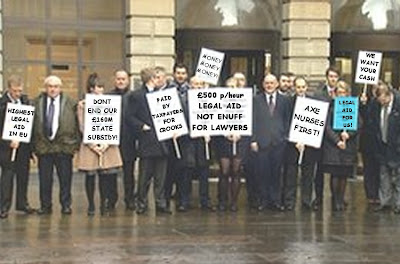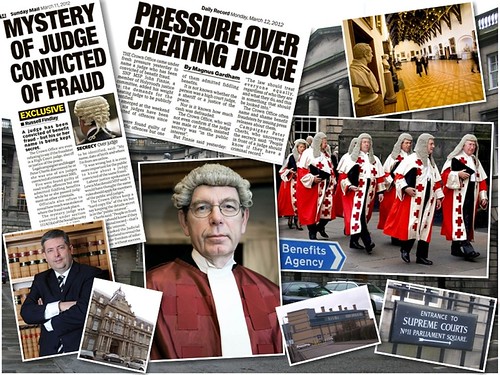 STRIKE ! More money for them, but Clients see little access to justice for legal aid hand-outs. LET’S not kid ourselves about the motives for recent strikes & protests by the Scottish legal profession against plans to cut Scotland’s ONE HUNDRED & SIXTY MILLION POUND legal aid budget, the highest legal aid budget in the entire European Union. This strike, and the protests outside the Scottish Parliament by cohorts of Scots lawyers carrying banners crying for “justice” is purely about more money for solicitors & law firms and has little to do with the profession’s call access to justice for Scots who may, rightly, or even wrongly, find themselves at the sharp end of the justice system for deeds they may or may not have committed.
STRIKE ! More money for them, but Clients see little access to justice for legal aid hand-outs. LET’S not kid ourselves about the motives for recent strikes & protests by the Scottish legal profession against plans to cut Scotland’s ONE HUNDRED & SIXTY MILLION POUND legal aid budget, the highest legal aid budget in the entire European Union. This strike, and the protests outside the Scottish Parliament by cohorts of Scots lawyers carrying banners crying for “justice” is purely about more money for solicitors & law firms and has little to do with the profession’s call access to justice for Scots who may, rightly, or even wrongly, find themselves at the sharp end of the justice system for deeds they may or may not have committed.
The strike certainly has nothing to do with Scots access to justice for civil legal aid, because in a week of listening to solicitors bleat like sheep about the rights of accused criminals to be funded on the legal aid purse, (and for those same solicitors to be entitled to collect more than £500 per hour), not one member of the legal profession has come forward to argue for increased attention to civil legal aid, particularly in cases where the legal profession’s own regulators have done the dirty on members of the public.
Yes, it’s all about easy pickings for the legal profession, rather than helping Scots out of complicated legal difficulties created not by their own doing, rather their reliance on the professions who claim to have their clients best interests at heart …
The fuss, as great as it appears to be, is all about our Justice Secretary Kenny MacAskill’s idea to force solicitors to collect legal aid contributions from clients accused of criminal offences.
Solicitors argue they should not become the Scottish Legal Aid Board’s debt collectors, while the Justice Secretary argues it is not cost effective for SLAB to collect these same contributions from clients (yet it appears to be cost effective for SLAB’s senior staff to fly around on international airlines apparently learning nothing about how legal aid is done in the rest of the world)
Perhaps what is really at stake is some of the nasty habits solicitors and certain advocates have developed, such as in some cases, well known to journalists & the Scottish Legal Aid Board where some of Scotland’s supposedly esteemed legal professionals regularly ask their clients for cash bungs to continue to defend them on criminal charges. Clearly, clients may end up asking why they have to make a cash contribution to SLAB as well as their solicitor if justice is really being served …
Of course, with the headlines of legal aid fraud, and solicitors walking away with millions of pounds of legal aid money even after being accused by SLAB of making dodgy claims, it would be reasonable for anyone to ask “Is MacAskill’s plan for lawyers to collect our money safe ?” Well, put it this way, his plan is about as safe as allowing gangsters & loan sharks to collect for the Red Cross.
Predictably, several strikes & protests on, Mr MacAskill is being forced back to the negotiating table with the legal profession and, as has happened before in previous cases where solicitors have threatened to strike such as in 2008 he will give in and the legal profession will continue to enjoy its £160 Million state subsidy for the time being. Times are tough, the legal profession must survive, axe nurses first, but don't axe your lawyers they say …. yet the important questions, such as whether an independent Scotland can afford its legal aid budget, and why legal aid fraudsters in the legal profession are never prosecuted … are never answered …
Time for a new Justice Secretary, anyone ? Surely after five years of disasters in the justice system, from World’s End to the continuing Lockerbie cover up to the review of the review of the review of Lord Gill’s condemnation of the Scottish Justice system in his 2009 Civil Courts Review and recent allegations of “Institutional Corruption” at Scotland’s Crown Office is well enough to require a new, firm pair of hands on the broken bottle that is our Scottish justice system ?
WHERE DOES ALL THE LEGAL AID GO ?
 EU report reveals Scots justice is more about lawyers & judges making money than delivering justice. A REPORT published by the European Commission for the Efficiency of Justice and featured in an article in Scotland’s Sunday Mail newspaper has revealed Scottish lawyers take tens of millions of pounds more in publicly funded legal aid representing the Scots population of just over five million people than lawyers working Italy, which has a population of sixty million, twelve times greater than that of Scotland.
EU report reveals Scots justice is more about lawyers & judges making money than delivering justice. A REPORT published by the European Commission for the Efficiency of Justice and featured in an article in Scotland’s Sunday Mail newspaper has revealed Scottish lawyers take tens of millions of pounds more in publicly funded legal aid representing the Scots population of just over five million people than lawyers working Italy, which has a population of sixty million, twelve times greater than that of Scotland.
The figures show that Scots lawyers ‘earned’ around ONE HUNDRED & SIXTY MILLION POUNDS of legal aid in 2010 while their Italian counterparts working for a much larger client base only took £100million, making the Scots legal aid bill, running at a cost of £31 a head, the most expensive in Europe in terms of population. The grim figures show that Scots legal aid is working out at a cost of £31 a head, with little in the way of access to justice to show for it.
The report, available on the EU website HERE (pdf) or online here : The European Commission for the Efficiency of Justice Report on Evaluation of European Judicial Systems also reveals Scots judges are paid the highest in Europe with Scottish Sheriffs taking home an average taxpayer funded salary of a staggering £120,000, while others on Scotland’s judicial benches take up to £200,000 a year plus expenses.
The Sunday Mail article reported on the EU study which exposed Scotland’s justice system as the costliest in the entire European Union :
By Russell Findlay Sunday Mail 30 September 2012
THE European Commission report reveals that Legal Aid in Scotland cost 203million euros (£161million) in 2010 - more than in Italy, which has a population of 61million.
SCOTS lawyers collected more taxpayers’ cash for Legal Aid than their counterparts in Italy – a country 12 times the size.
A European Commission report reveals that Legal Aid in Scotland cost 203million euros (£161million) in 2010 – around 39 euros, or £31, for every one of our 5.2million people.
Lawyers in Italy, which has a population of 61million, got just £100million of public cash – £1.50 per person.
The 450-page Brussels report also found that Denmark, with 5.6million people, paid its lawyers only 88million euros (£70million).
And in Belgium – population 10.9million – legal aid cost 75million euros (£59million).
The revelations, in a 450-page report by the European Commission for the Efficiency of Justice – came as the Scottish Legal Aid Board banned three lawyers from claiming cash for criminal cases.
We can reveal that Gerard Tierney, Massimo D’Alvito and Andrew Brophy, of Blantyre, Lanarkshire, breached the board’s code of practice. Tierney and D’Alvito have been reported to the Crown Office, who will decide whether to prosecute.
The ban also extends to Tierney’s firm G Tierney & Co, of Auchinleck, Ayrshire, who have raked in £610,500 in Legal Aid over three years, and Edinburgh firm Massimo D’Alvito Defence Lawyers.
The European report looked at 47 criminal justice systems across the continent.
It found the cost per person of Legal Aid in Scotland was third-highest – behind only Northern Ireland and England and Wales. The cost per person was 53.5 euros in Northern Ireland and 45.7 euros in England and Wales.
The findings led to calls for a radical overhaul of Legal Aid.
Central Ayrshire Labour MP Brian Donohoe said: “It seems major organised criminals and terror suspects qualify for unlimited Legal Aid, yet I have constituents who don’t get a penny simply because they have a few thousand pounds of savings.
“The system in Scotland and the rest of the UK is out of control.”
Legal blogger Peter Cherbi added: “Legal Aid is no longer about access to justice for the poor, but a state subsidy for the legal profession – and one they don’t seem keen on talking about.”
The Sunday Mail has exposed a series of rogue lawyers banned from claiming Legal Aid. But none of the 14 reported to prosecutors was put in the dock, prompting claims that Scotland’s legal self-regulation system protects lawyers.
Kilmarnock solicitor Niels Lockhart, who took £600,000 in Legal Aid in just two years, was found to have made “unnecessary and excessive” claims. The Legal Aid board withdrew their complaint to the Law Society after he agreed to stop claiming.
Reacting to the Brussels report, the Scottish Legal Aid Board said: “Across Europe, there are substantial differences between judicial systems and very different approaches to the provision of legal aid and its cost.
“The Scottish system is highly regarded internationally for the efforts made to ensure access to justice.
“The Scottish Government’s budget allocation for the Legal Aid Fund has reduced significantly in 2011-12 and is planned to reduce further in future years.”
Justice Secretary Kenny MacAskill hopes to cut the Legal Aid bill by making criminals pay some of their costs. The planned move, outlined in a Holyrood Bill, could save taxpayers around £3.9million.
• The Euro study showed that Scotland disciplined a tiny number of lawyers compared to countries of similar size.
Just three were struck off and 13 reprimanded in Scotland in 2010.
Denmark, with a similar population, took action against 309 lawyers, with six struck off and 145 fined. And in Finland, also close in size, 99 rogue solicitors were sanctioned.
Critics blame the Law Society of Scotland’s dual role of representing lawyers while also acting as regulator.
• A large proportion of alleged criminals reported to prosecutors in Scotland are not being put in the dock.
Of 265,830 cases sent to the Crown Office, only 41.7 per cent were brought to court. In England and Wales, 90.6 per cent of all cases resulted in court action.
The difference is thought to be partly due to Scotland’s recent introduction of spot fines and fiscal fines for what the authorities insist are more minor offences.
Critics claim such fines lead to a secret justice system.
• The report reveals that Scotland’s sheriffs top the European pay league.
Researchers compared the wages of lower court judges across Europe.
Our sheriffs, with an average salary of 150,106 euros (£120,000), were number one, ahead of the Irish and Swiss.
Next were sheriffs’ counterparts in England and Wales, who were paid 120,998 euros (£95,000).
Not only were sheriffs the highest-paid, they also topped the table comparing their earnings to the national average. They earned 5.2 times the average Scot’s wage.






